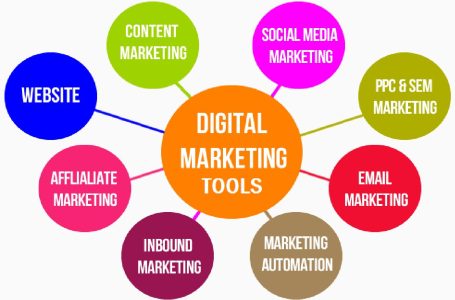In the digital age, technology plays a vital role in our daily lives. A potent weapon has arisen in digital marketing. In particular, for enterprises to engage with their target market. Digital marketing technologies have revolutionized how companies promote their products and services like BetAmo casino. This enables them to reach a global audience. In this way, they can measure campaign effectiveness and personalize marketing strategies. This article delves into the various aspects of digital marketing technologies. We will further explore their evolution, key components, and significant benefits.
I. Evolution of Digital Marketing Technologies:

Digital marketing technologies have evolved a lot over the years. It has adapted to changes in consumer behaviors and advancements in technology. The key milestones in their evolution include:
Websites and Search Engines:
The emergence of websites and search engines laid the foundation for digital marketing. Businesses started optimizing their websites for search engines, which improved their visibility in search results and attracted organic traffic.
Email Marketing:
Businesses can communicate with their customers using email marketing. This technique delivers personalized messages and promotional offers, and it continues to be an effective tool for customer retention and lead nurturing.
Social Media:
The rise of social media platforms provided businesses with new avenues to engage with their target audience. Platforms like Facebook, Twitter, and Instagram enabled companies to build brand awareness. They also run targeted advertising campaigns and foster customer relationships.
Content Marketing:
Content marketing gained prominence as a strategy to attract, educate, and engage customers. Blogs, articles, videos, and infographics became integral to digital marketing campaigns. They position companies as industry thought leaders in their specific fields.
Mobile Marketing:
With the proliferation of smartphones, mobile marketing has become crucial for businesses. Techniques such as mobile ads allow companies to reach consumers on their mobile devices, delivering more personalized experiences.
II. Key Components of Digital Marketing Technologies:
Digital marketing technologies encompass a wide range of tools and techniques. The key components include:
Search Engine Optimization (SEO):
To rank higher in search engine results, websites must be optimized for SEO. It includes keyword research, on-page optimization, link building, and technical enhancements. This is to improve website visibility and attract organic traffic.
Pay-Per-Click Advertising (PPC):
PPC advertising entails posting advertisements on social media sites or search engines. Businesses pay when users click on their ads. This method offers precise targeting options and provides instant visibility to businesses.
Social Media Marketing:
As mentioned above, content creation and sharing on social media platforms are both aspects of social media marketing. This allows engagement with the target audience. It includes organic posting, paid advertising, influencer marketing, and social media analytics.
Content Marketing:
Content marketing focuses on creating relevant content to attract and retain customers. This includes blogs, articles, videos, podcasts, and infographics that educate, entertain, or solve customers’ problems.
Email Marketing:
As mentioned above, email marketing involves sending targeted emails to a list of subscribers. This practice nurtures leads, promotes products, and builds customer relationships. It often includes personalized content, automated workflows, and segmentation.
III. Benefits of Digital Marketing Technologies:
Digital marketing technologies offer many advantages for businesses:
Global Reach:
Digital marketing breaks geographical barriers. It enables businesses to reach a global audience without significant infrastructure or costs. Companies can expand their market reach and target specific demographics, increasing brand exposure and sales opportunities.
Cost-Effectiveness:
Digital marketing is typically more economical than traditional marketing strategies. Techniques like social media advertising, email marketing, and content marketing are vital. They enable companies to connect with a large audience. It’s important to note that this is at a fraction of the cost of traditional advertising channels.
Targeted and Personalized Marketing:
Digital marketing technologies provide businesses with precise targeting options. Demographics, interests, and online behavior is considered. This allows companies to tailor their marketing messages. In this way, they offer to specific customer segments, enhancing relevance and engagement.
Real-Time Analytics and Insights:
Digital marketing technologies offer robust analytics and tracking tools. One that provides real-time insights into campaign performance. Businesses can measure key metrics, track conversions, and make data-driven decisions. This optimizes their marketing strategies.
Enhanced Customer Engagement:
With digital marketing, businesses can interact with their customers in real time and respond to their queries, feedback, and concerns. Social media platforms, chatbots, and personalized email campaigns foster customer engagement and loyalty.
III. Disadvantages of Digital Marketing Technologies:
Digital marketing technologies have brought many benefits to businesses. Yet, it is important to acknowledge the negative effects they can have. One significant concern is the invasion of privacy. Digital marketing technologies often collect vast amounts of personal data. This leads to privacy breaches and potential misuse of information. Additionally, constant exposure to targeted advertisements can be intrusive and overwhelming for consumers. This contributes to a sense of information overload and manipulation.
Moreover, the reliance on digital marketing can create a digital divide. A place where individuals without internet access or digital literacy skills are excluded. They do not get to see the benefits provided by online marketing strategies. Furthermore, the prevalence of false information and online scams can undermine trust. They can compromise the credibility of legitimate businesses. It is crucial to address these negative effects. Thus, ensure that ethical practices and regulations are in place. The regulations protect individuals and maintain a balanced digital marketing ecosystem.
Final Thoughts
In conclusion, digital marketing technologies have revolutionized the way businesses make connections. It is a solid way to promote their products and services, from the evolution of websites and search engines to the advent of social media. Mobile marketing and digital marketing offer a wide array of powerful tools. As mentioned before, it has enabled businesses to reach a global audience. It allows businesses to personalize marketing strategies and measure campaign effectiveness. All of this is done in real-time.
Harnessing the potential of digital marketing technologies while being mindful is key. Businesses can navigate the digital landscape and drive meaningful connections with their customers. We co-exist in the dynamic and ever-evolving digital era.





